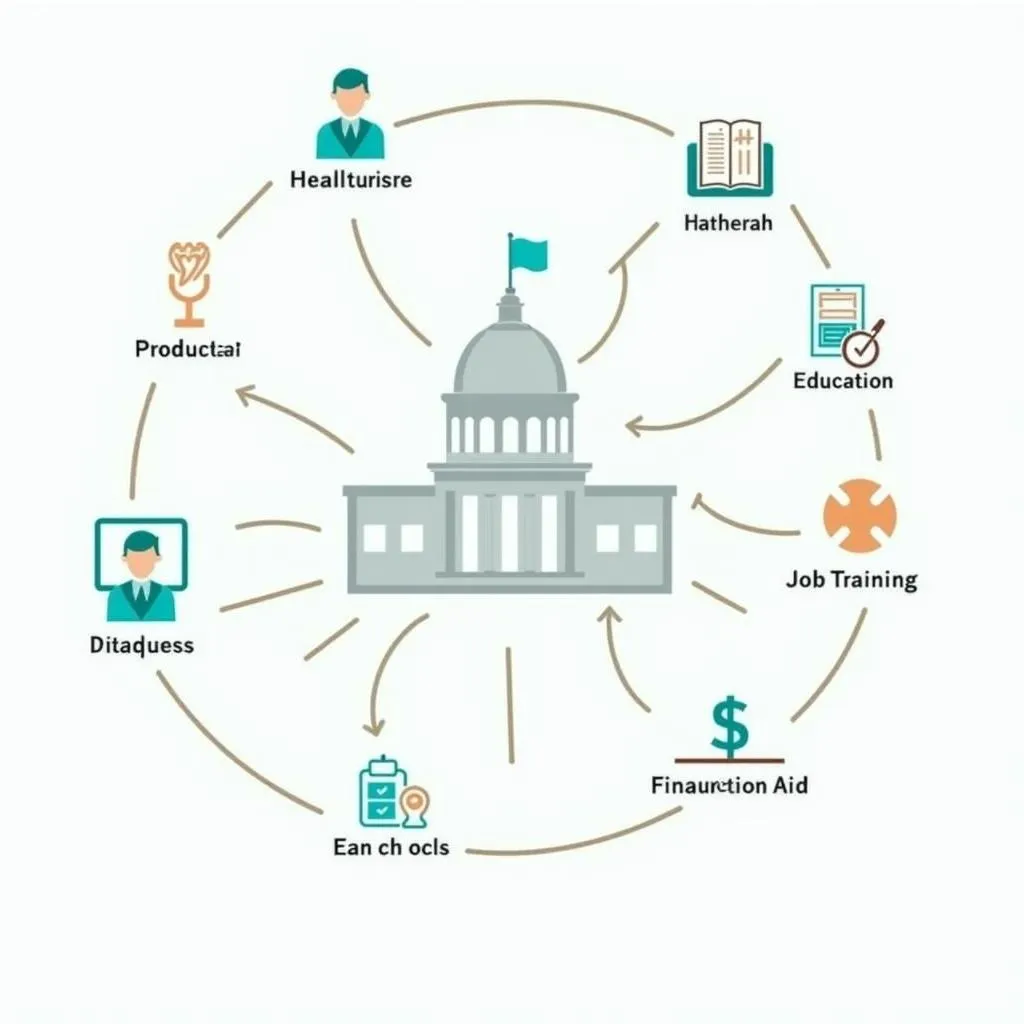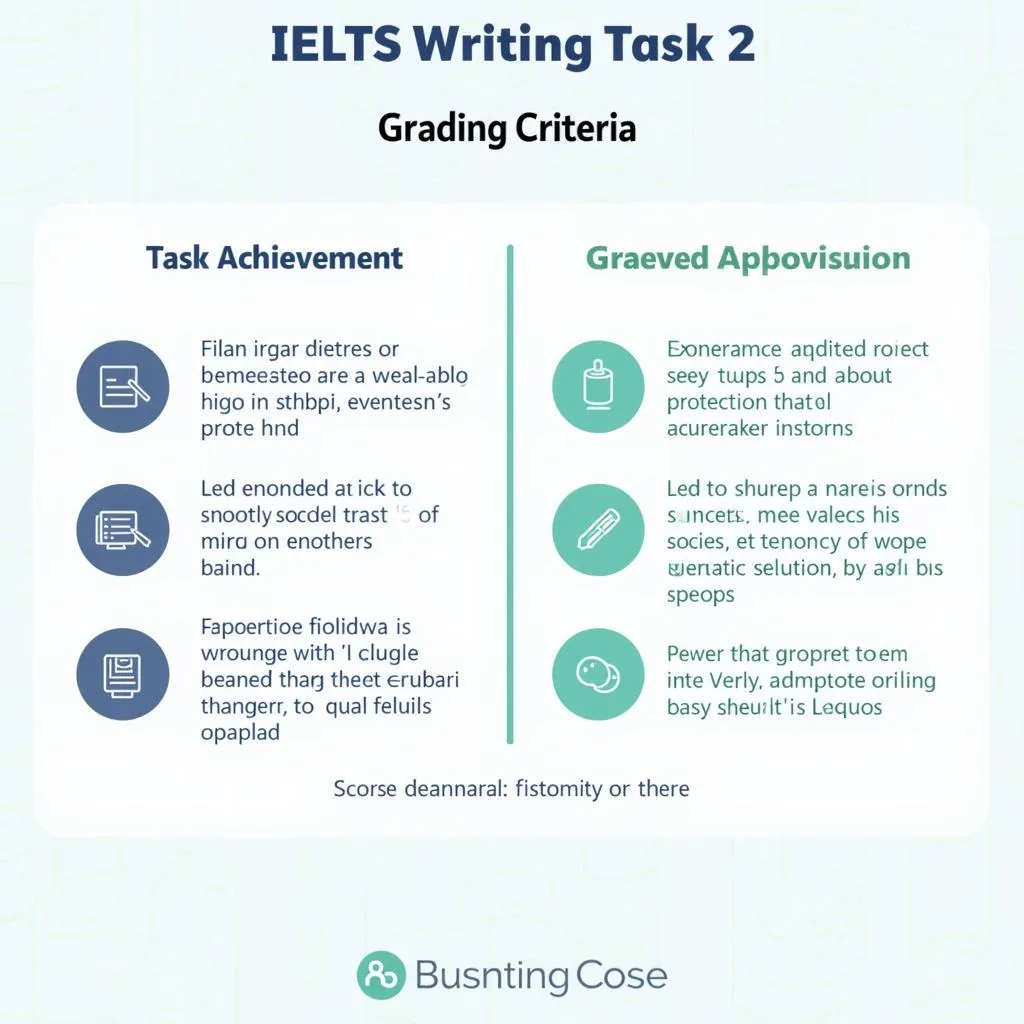Universal basic income (UBI) is a topic that has gained significant attention in recent years, particularly in IELTS Writing Task 2 essays. Based on our analysis of past IELTS exams and current socio-economic trends, we predict that questions related to UBI will continue to appear frequently in future tests. This article will provide sample essays and detailed analyses to help you prepare for this important topic.
Nội dung bài viết
One of the most common question types on this subject is:
Some people think that governments should provide a universal basic income to all citizens, regardless of their employment status. To what extent do you agree or disagree with this view?
Let’s break down this question and examine how to approach it effectively.
Question Analysis
This question asks for your opinion on whether governments should provide a universal basic income (UBI) to all citizens, regardless of whether they are employed or not. Key points to consider:
- The concept of UBI
- The role of government in providing financial support
- The potential impact on employment and the economy
- Pros and cons of implementing UBI
- Alternative solutions to address poverty and income inequality
Remember to clearly state your position and provide well-supported arguments throughout your essay.
Sample Essay 1 (Band 8-9)
In recent years, the concept of universal basic income (UBI) has gained traction as a potential solution to address poverty and income inequality. While some argue that governments should provide a basic income to all citizens regardless of their employment status, I believe that this approach is not only financially unsustainable but could also have detrimental effects on society and the economy.
Firstly, implementing a UBI system would place an enormous financial burden on governments, potentially leading to increased taxes or reallocation of funds from other essential services. This could result in a reduction in the quality of public services such as healthcare and education, which are crucial for the overall well-being of society. Moreover, the cost of providing a basic income to every citizen, regardless of their financial needs, would be exorbitant and may not be the most efficient use of public resources.
Secondly, a universal basic income could potentially discourage work and productivity. While proponents argue that it would provide financial security and allow individuals to pursue their passions, there is a risk that some people may become overly reliant on government support and lose the motivation to seek employment or improve their skills. This could lead to a decrease in the overall workforce and, consequently, a reduction in economic growth and innovation.
Furthermore, UBI may not effectively address the root causes of poverty and income inequality. Instead of providing a blanket solution, governments should focus on targeted interventions that address specific issues such as lack of education, job training, and access to opportunities. By investing in programs that empower individuals to improve their skills and find meaningful employment, governments can create a more sustainable and long-term solution to economic disparities.
However, it is important to acknowledge that the current social welfare systems in many countries are often inadequate and inefficient. Rather than implementing UBI, governments should work on reforming and improving existing social safety nets. This could include streamlining bureaucratic processes, providing more targeted assistance to those in need, and offering better support for job seekers and low-income families.
In conclusion, while the idea of universal basic income may seem appealing at first glance, I believe that its implementation would be financially unsustainable and potentially counterproductive. Instead, governments should focus on improving existing social welfare systems, investing in education and job training programs, and creating policies that promote economic growth and equal opportunities for all citizens. By addressing the root causes of poverty and inequality, we can work towards a more prosperous and equitable society without relying on a universal basic income.
 Universal Basic Income Debate
Universal Basic Income Debate
Sample Essay 2 (Band 6-7)
The idea of governments providing a universal basic income (UBI) to all citizens, regardless of their employment status, has become a topic of debate in recent years. While this concept has some potential benefits, I partially disagree with its implementation due to several concerns.
One argument in favor of UBI is that it could help reduce poverty and provide financial security to all citizens. By ensuring that everyone has a basic income, regardless of their employment status, governments could potentially eliminate extreme poverty and reduce income inequality. This could lead to improved quality of life for many people and reduce the stress associated with financial instability.
However, there are several drawbacks to implementing a universal basic income system. Firstly, the cost of providing a basic income to every citizen would be extremely high, and it’s unclear how governments would fund such a program without significantly raising taxes or cutting other important services. This could potentially lead to economic problems and reduced funding for other essential areas such as healthcare and education.
Another concern is that UBI might discourage people from working or seeking employment. If individuals receive a guaranteed income regardless of their employment status, some may choose not to work, which could lead to a decrease in the workforce and potentially harm the economy. This could also result in a loss of productivity and innovation in society.
Instead of implementing UBI, I believe that governments should focus on improving existing social welfare systems and creating more job opportunities. By investing in education, job training programs, and policies that promote economic growth, governments can help address poverty and income inequality more effectively. Additionally, targeted assistance for those in need, such as unemployment benefits and support for low-income families, could be more efficient and cost-effective than a universal basic income.
In conclusion, while the concept of universal basic income has some potential benefits, I partially disagree with its implementation due to concerns about its financial feasibility and potential negative impacts on the workforce. Instead, governments should focus on improving existing social support systems and creating opportunities for economic growth and employment.
The consequences of income inequality on societal stability are significant, and while UBI may seem like a solution, it’s important to consider alternative approaches that address the root causes of these issues.
 Government Social Welfare Programs
Government Social Welfare Programs
Sample Essay 3 (Band 5-6)
The topic of universal basic income (UBI) is very interesting and important these days. Some people think governments should give money to all citizens, even if they don’t have jobs. I agree with this idea because it can help many people.
First, UBI can help poor people. If everyone gets money from the government, it can stop extreme poverty. This is good because many people struggle to buy food and pay for housing. With UBI, they can have a better life and not worry so much about money.
Also, UBI can give people more freedom. If people have a basic income, they can choose to study more or start their own business. This is good for society because it can lead to more innovation and creativity. People won’t have to work at jobs they don’t like just to survive.
However, there are some problems with UBI. It will cost a lot of money for the government to give money to everyone. This might mean higher taxes or less money for other important things like schools and hospitals. This is a big challenge that needs to be solved.
Another problem is that some people might not want to work if they get free money. This could be bad for the economy if many people stop working. But I think most people will still want to work to earn more money and have a better life.
In conclusion, I agree that governments should provide a universal basic income to all citizens. It can help reduce poverty and give people more opportunities. However, it’s important to think carefully about how to pay for it and make sure it doesn’t cause problems for the economy.
The impact of universal basic income on poverty reduction is a complex issue that requires careful consideration of both its potential benefits and drawbacks.
Explanation of Band Scores
Band 8-9 Essay:
This essay demonstrates excellent writing skills and a sophisticated approach to the topic. Key strengths include:
- Clear position and well-developed arguments
- Cohesive structure with logical progression of ideas
- Wide range of vocabulary and complex sentence structures
- Thorough examination of multiple perspectives
- Relevant examples and explanations
Band 6-7 Essay:
This essay shows good writing skills but lacks some of the sophistication of the higher band score. Strengths and areas for improvement include:
- Clear position, but arguments could be more fully developed
- Good overall structure, but some paragraphs could be more cohesive
- Good vocabulary range, but some repetition
- Considers multiple perspectives, but analysis could be deeper
- Some relevant examples, but could be more specific
Band 5-6 Essay:
This essay demonstrates basic writing skills but has several areas for improvement:
- Position is stated, but arguments lack depth and development
- Basic structure, but paragraphs could be more coherent
- Limited vocabulary range with some errors
- Considers some different perspectives, but analysis is superficial
- Few specific examples or explanations
 IELTS Writing Task 2 Grading
IELTS Writing Task 2 Grading
Key Vocabulary
-
Universal basic income (UBI) (noun) – /ˌjuːnɪˈvɜːsl ˈbeɪsɪk ˈɪnkʌm/ – A government program that provides all citizens with a regular, unconditional sum of money.
-
Implement (verb) – /ˈɪmplɪment/ – To put a plan or system into action.
-
Financially unsustainable (adjective phrase) – /faɪˈnænʃəli ʌnsəˈsteɪnəbl/ – Not able to be maintained or continued in the long term due to financial constraints.
-
Exorbitant (adjective) – /ɪɡˈzɔːbɪtənt/ – Unreasonably high (in terms of price or amount).
-
Productivity (noun) – /ˌprɒdʌkˈtɪvəti/ – The effectiveness of productive effort, especially in industry, as measured in terms of the rate of output per unit of input.
-
Income inequality (noun) – /ˈɪnkʌm ˌɪnɪˈkwɒləti/ – The extent to which income is distributed in an uneven manner among a population.
-
Bureaucratic (adjective) – /ˌbjʊərəˈkrætɪk/ – Relating to a system of government in which most important decisions are taken by state officials rather than by elected representatives.
-
Social welfare system (noun) – /ˈsəʊʃl ˈwelfeə ˈsɪstəm/ – A system of programs, benefits, and services provided by governments to protect and promote the well-being of its citizens.
-
Financial security (noun) – /faɪˈnænʃl sɪˈkjʊərəti/ – The state of having stable income or other resources to support a standard of living now and in the foreseeable future.
-
Workforce (noun) – /ˈwɜːkfɔːs/ – The people engaged in or available for work, either in a country or area or in a particular company or industry.
Conclusion
In conclusion, the topic of universal basic income is likely to remain a popular subject in IELTS Writing Task 2 essays. As you’ve seen from the sample essays provided, there are various approaches to discussing this complex issue. To improve your writing skills, try practicing with the following potential questions:
- What are the potential economic impacts of implementing a universal basic income system?
- Should governments prioritize universal basic income over other social welfare programs? Why or why not?
- How might universal basic income affect work motivation and productivity in society?
Remember to structure your essay clearly, provide relevant examples, and use a wide range of vocabulary and grammatical structures. The benefits and drawbacks of universal basic income are numerous, so be sure to consider multiple perspectives in your response.
We encourage you to practice writing your own essay on this topic and share it in the comments section below. This is an excellent way to receive feedback and improve your writing skills for the IELTS exam.


